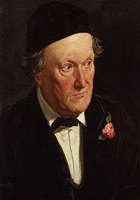The Sickle Poem by William Bell Scott
The Sickle
AN AUTUMNAL ODE.
I.
Reach the old Sickle from the wall
Where it hath hung so long.
The reaper's re-awakening song
Sounds the autumn's annual call,
Bewildering the watchful hare
In his yet unhunted lair.
Dear old Sickle, once again
The undergrowth of poppies red,
Whose beauties on themselves were shed,
Shall dazzle soon the trembling air,
When the wheat-ears over head
Across thy curved blade have lain,
In triumph as the reaper's eye
Smiles to his fair mate jocundly.
Sacred old Sickle, while the wind
Died on the winter's crisped rind,
And the mossed thatching o'er the door
Was whiter than now is the mill's white floor,
Thou broughtest July's sun to mind:
And so, when May-day breezes blew,
And made each building bird renew
The search for straws and sticks, 'twas thou
For whom we blessed the fledgeling bough,
Then through high summer's long bright eves
Sat the dear saint Tranquility,
Longing to see them gild the sheaves,
And, bread-rich Sickle, glance on thee
Over the villager's shoulder flung,
Love-making fieldward, blythe and young.
II.
Most potent sun, how beautiful
Old harvest days have been,
With health and peace, the garner full,
The fields more yellow than green;
When upwards thrown on the arch that leaps
The fly-frequented stream,
Where the tired midday traveller sleeps,
Danced ever-more the ripple's gleam,
And on its ledge a white-haired child
Sat for idling hours beguiled,
Peeping down right cautiously
A glimmering water friend to see
Smiling from beneath, with hair
Like his own but still more fair.
Beside him laid the bunch of grain,
His earnings in the gleaning train
Then seen through hedge-rows here and there,
Gay in their sun-bright rustic dress,
Where the binder rears the sheaves
At intervals in grouped caress,
Joking wisely as he leaves
Each rustling girth of fruitfulness,
And the looped-up damsels go
Far down the field, now fast, now slow,
Now resting in the sultry air,
Or throwing back betimes their hair
As it falls before their eyes
When they stoop or when they rise.
III.
Beloved Sickle, thou hast been
Where lyre or sword were never seen,
And round thee, like the ivy screen
Around a faun's brown knotted hair,
Clung hopes and fears and blessings rare.
In a warmer clime
In a distant time
A goddess held thee in her hand
About whose head's immortal band
Were braided ears of bearded corn,
More loved than even the halo borne
By Phœbus or than Dian's horn.
Round this maternal-goddess' shrine
There was a flower-encircled glow
Of fruitage and of wine,
To her the autumnal overflow
Was borne with hymns divine.
This goddess is departed now,
No more she guides the timely plough,
It grides along alone:
No more men light her temple dim,
Aud the consecrating hymn,
Dear Sickle, long hath been thine own.
IV.
The goddess gone! ah, no more here
But wrapt up with our school-boy gear
Of dactyl and trochee, no more
On this side of the Stygean shore!
The Sickle too, when I was young,
A doleful when, so long ago!
Was polished bright though never sung.
But now alack, it too must go
Among forgotten things too slow
For these our frantic hours of speed:
No more the boast of kirtled maid,
It rusts among the long decayed;
Nor more, like Ruth, the gleaner need
Stoop her flexile back to-day.
Make clear the way!
The grand machine with man and steed,
And countless knives and clash of steel,
Passing on its dangerous fray,
Makes the child run, the old man reel.
Nor there the end, with welcome sway
From prairies vast the steamship braves
The grim Atlantic's mightiest waves,
Filled with grain from that far land.
The farmer turns his eyes away,
The Sickle dropping from his hand
This poem has not been translated into any other language yet.
I would like to translate this poem